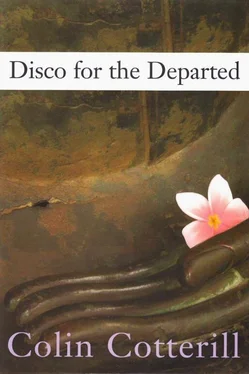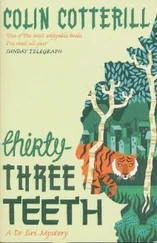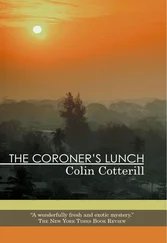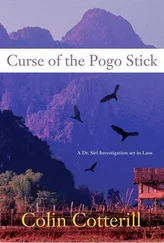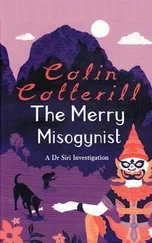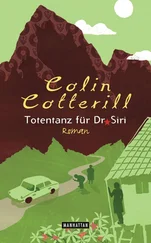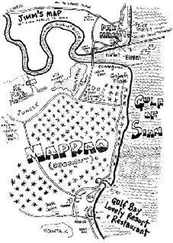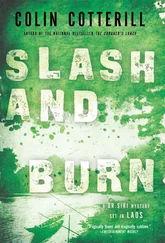Colin Cotterill - Disco for the Departed
Здесь есть возможность читать онлайн «Colin Cotterill - Disco for the Departed» весь текст электронной книги совершенно бесплатно (целиком полную версию без сокращений). В некоторых случаях можно слушать аудио, скачать через торрент в формате fb2 и присутствует краткое содержание. Жанр: Полицейский детектив, на английском языке. Описание произведения, (предисловие) а так же отзывы посетителей доступны на портале библиотеки ЛибКат.
- Название:Disco for the Departed
- Автор:
- Жанр:
- Год:неизвестен
- ISBN:нет данных
- Рейтинг книги:3 / 5. Голосов: 1
-
Избранное:Добавить в избранное
- Отзывы:
-
Ваша оценка:
- 60
- 1
- 2
- 3
- 4
- 5
Disco for the Departed: краткое содержание, описание и аннотация
Предлагаем к чтению аннотацию, описание, краткое содержание или предисловие (зависит от того, что написал сам автор книги «Disco for the Departed»). Если вы не нашли необходимую информацию о книге — напишите в комментариях, мы постараемся отыскать её.
Disco for the Departed — читать онлайн бесплатно полную книгу (весь текст) целиком
Ниже представлен текст книги, разбитый по страницам. Система сохранения места последней прочитанной страницы, позволяет с удобством читать онлайн бесплатно книгу «Disco for the Departed», без необходимости каждый раз заново искать на чём Вы остановились. Поставьте закладку, и сможете в любой момент перейти на страницу, на которой закончили чтение.
Интервал:
Закладка:
“Thank you. Thank you, Doc. Thank you.” The guard mumbled the words a hundred times. The thanks, of course, were for the preservation of his own skin. He had no interest in the well-being of his royal charge.
Before Siri left the room, he saw the bamboo klooee on the desk. “Ah, so this is the weapon that’s been inflicting pain on us since we got here. You only know the one tune?” he asked.
“And I can’t even get that right.”
“When I see you next, you’ll have a thousand tunes of the jungle, and you’ll be playing them to the envy of the birds in the trees. Mark my words.” He gripped the prince’s arm and smiled at him. “Give my regards to your father when next you meet him. He’s an impressive man-with an impressive son.”
Divine Impotence
Mr. Geung had left the forested mountain slopes and entered a valley that contained the first rice fields he’d seen on his walk. The rice stubble crunched under his feet. Everything seemed so dry, so dead. His country had been politicked into a drought. With every postrevolution month that passed, the Pathet Lao government was learning how much more difficult it was to run a country of warm bodies than it had appeared to be on paper. For ten years in the caves of Huaphan, the dream had always been to gain power. As few of the cadres honestly believed that dream would ever come true, no detailed plans were laid for the future. No practical policy of public appeasement was worked out. Nothing spoiled a good popular uprising more than the presence of people and the need to satisfy their unreasonable demands.
In Laos in 1977, the population was becoming more and more restless. The new leaders had been given over a year to show what they were capable of, but successes were rare. Some folks even dared to suggest that the communists were no better than the Royalists. The euphoria of victory was slowly giving way to politburo paranoia, and the resulting measures had caused even more dissent. In an effort to discourage large public gatherings, festivals were either cancelled completely or greatly restricted. They were trimmed of religion, culture, and superstition, which naturally left very little to celebrate. Dr. Siri had compared this with allowing the wearing of spectacles but banning the use of glass lenses.
One such muted celebration had been the May Rocket Festival. Obviously, the combination of disgruntled villagers and large quantities of gunpowder was more than the authorities could tolerate. The government banned gatherings in built-up areas and restricted all activities to remote fields policed by both uniformed and quite obvious plainclothes soldiers. Female spirit mediums who normally gave the festival its meaning were barred from attending. There was to be no alcohol, no raucous music, and all activities had to be completed before nightfall. The amount of powder allowed for each bamboo shaft was so niggardly that many of the homemade rockets barely left their launchpads. They lurched a few meters into the air, then fizzled, and fell to earth. There were spontaneous screams of panic from the fleeing onlookers but few cheers of delight.
The consequences of this debacle reached far beyond the disappointed villagers and their wasted day. The Rocket Festival was a fertility rite. The noise and gaiety should have awakened the gods of lust from their yearlong slumber. The spirit mediums would remind the roused deities that the time had come to send the rains and replenish the paddies. The phallic rockets would stimulate a heavenly orgy and the sexual juices would spill over onto the land. Thus would a rich harvest result.
This was what the villagers believed. The new leaders had no place in their soulless socialist hearts for such mythology. Marxist-Leninist doctrine had no time for fairy tales. Buddhism and animism were sins against rational thought, and logic would always prevail in a communist system. They’d see, these simple folk. The rains would come in May as they always had, and the populace would begin to believe in socialist order.
The subdued May Day celebrations passed with the same lack of enthusiasm as had the Rocket Festival. May gave way to June and the gods of fertility still slumbered. The skies remained clear and the rice fields cracked and turned to dust. By July the people had no doubt that the new government was responsible for this unprecedented drought. Socialism was having a negative effect on the weather. This was clear to even the most simple of minds. The government’s attempts at quelling dissent had only succeeded in exacerbating it.
All Mr. Geung knew of this was that the fields crunched under his feet, but his new boots made light of the terrain. They’d belonged to the old lady’s husband, who had no use for them in his funeral pot. They were too small for her son but they fitted Geung to a T and made him feel proud to own them. She’d given him a large pack of dried food and smeared him with a foul-smelling ointment she promised would keep off even the vindictive dengue-bearing mosquitoes that plagued the land.
“W… we should f… f… follow the road,” he told Dtui, who marched beside him. “But n… n… not be on it.” The old lady had dragged his story from him over breakfast and was sure the soldiers from whom he had escaped would be searching for him.
“Stay close to the road but not on it,” she’d told him. “If a car or truck comes from behind you that isn’t the green of the army, beg them for a ride. Stay away from anything green. Got it?”
The words were embedded in his brain but some of the concepts hadn’t taken root. “From behind you” was surely confusing, because if he turned around, anywhere could be behind him. And as he always looked out through the leaves of trees, it seemed that everything he saw passing along the road was green.
Geung had walked for the whole day. The urgency of returning to the morgue was his impetus. He ached. He wheezed. His anxiety rose and fell, as if he were riding to Vientiane on the back of a dragon. But when he heard a loud crack and saw a bloodstain appear on the front of his shirt, he was surprisingly calm.
“A… a… a bullet wound,” he said as if assessing his state for observers at the morgue. He stood still and watched the red rose grow into a country, one of the countries in Dtui’s atlas that she tried to convince him contained millions of people. What tiny, tiny people they must be. The stain grew to something like the USSR before Geung’s eyes. He became pale and dropped like a fence post to the ground.
More panic. More emergencies and disasters. Soon, emergencies fell into a sort of natural ranking: drop-everything emergencies, do-what-you-can emergencies, and you’ll just-have-to-wait emergencies. Disasters, too, had their own ratings: unavoidable, did-the-best-we-could, my fault/your fault. Then there were godlike moments when a decision had to be made as to who most deserved to die. By the afternoon of her second day, Dtui wondered whether her heart had shrunk. She felt less. People had become less human. Death had become less of a tragedy. Her patients weren’t blacksmiths or housewives, they were percentages. “With this little skill and this little pharmaceutical backup, this patient-let’s call her number seven-has a forty percent chance of survival.”
It amazed and saddened her that, in order to do her job properly, she had to stop caring. With all his years of battlefield surgery, she understood now that Dr. Siri must have been working the percentages for a long time. It hadn’t made him cold, just philosophical. The burden was less if he lost patients when the odds were against him. Dtui had to play it that way, too, at Kilometer 8.
The lull came midafternoon. They’d sent two up the slope. They’d stabilized three. Dtui was on an adrenaline high that lifted her like a flying carpet. Tired though she was, a sledgehammer to the head couldn’t have put her to sleep. She prowled the wards like a large unblinking polar bear. She bullied patients to stay alive, ordered medicines to work. At the end of the ward, the Hmong orderly, Meej, was searching without hope for a vein on the chopstick-thin arm of a patient. Meej was a stocky, good-looking man in his twenties. Like Dtui, his natural expression was a smile.
Читать дальшеИнтервал:
Закладка:
Похожие книги на «Disco for the Departed»
Представляем Вашему вниманию похожие книги на «Disco for the Departed» списком для выбора. Мы отобрали схожую по названию и смыслу литературу в надежде предоставить читателям больше вариантов отыскать новые, интересные, ещё непрочитанные произведения.
Обсуждение, отзывы о книге «Disco for the Departed» и просто собственные мнения читателей. Оставьте ваши комментарии, напишите, что Вы думаете о произведении, его смысле или главных героях. Укажите что конкретно понравилось, а что нет, и почему Вы так считаете.
